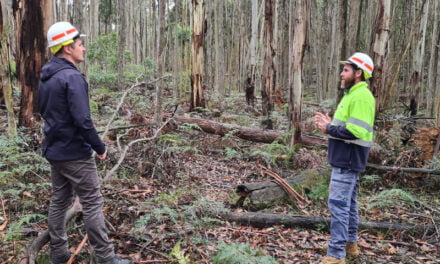The records of workplace regulators are filled with cautionary tales. By Emma Watt.
Safety regulators around Australia join the courts in enforcing laws regarding safe work sites. Here are summaries of two safety cases prosecuted by regulators, and one case where an employee applied to the Fair Work Commission. These employers have been found to have failed in their duties, and paid the price.
Business owner fined and imprisoned after forklift death
In January 2019, Maria Jackson, a 72-year-old woman who was the owner and operator of a scrap metal business in Foster (regional Victoria), was sentenced to six months imprisonment. She was also fined $10,000 and ordered to pay costs of $7336.
Ms Jackson drove the forklift at the workplace, despite never having held a forklift licence. Her actions on the forklift led to the death of a worker.
In February 2017, Ms Jackson was transferring scrap metal from inside a 1.8m metal bin into a larger metal bin. Another worker was positioned inside the smaller bin which had been raised to approximately 3 metres from ground level by Ms Jackson, on the forklift. The 1.8 metre scrap bin that the worker was standing in was not secured to the forklift or the forklift tines. The bin raised on the tines had only one channel (instead of the required two) on its base.
According to the judgement, no attempts were made to secure the bin to the forklift. This bin was in very poor condition with holes and corrosion in various locations. The forklift tines were not spread as wide as they could be and were not central on the mast of the forklift. The task was also being carried out on uneven ground with a slight incline.
The worker fell from the bin, then the bin fell off the forklift. The corner of the bin landed on the worker’s head, killing him.
Company director imprisoned for one year and fined $1 million
Gary Lavin, director of a Sunshine Coast roofing company, has been sentenced to a year in prison, suspended after four months, and the company, Multi-Run Roofing, was fined a record $1 million. The prosecution followed the death of a worker who fell almost six metres to his death while working on an unprotected roof edge.
The court heard that Mr Lavin had decided not to install edge protection on the roof as he was trying to save money. The conduct was described as reckless.
Instead, the workers were using the rails of scissor lifts as barriers along the roof edge, and the idea was apparently that the worker on the edge straightening the roofing sheets was to have been wearing a harness. However, at the time the worker fell to his death he was not wearing a harness, and he had apparently tripped or stumbled near the edge of the roof.
The court found that while the workers involved were competent, the risk was significant, as those working at the “roof edge were working with a narrow margin for error”. The method adopted also relied on the diligence of the workers, in circumstances where they were engaged in repetitive work.
Importantly, edge protection would have stopped the fall and the lack of it could have been easily addressed, given it was agreed the roofing company would be paid to install it and there was edge protection on site.
Self-described ‘Nazi Sparky’ unfairly dismissed apprentice
Simon Hickey, a Brisbane electrical contractor who calls himself the ‘Nazi Sparky’, has been ordered to pay an apprentice more than $11,000 after the former employee ran a successful unfair dismissal claim.
Mr Hickey believed that the apprentice, together with a former employee who had previously been dismissed, had used his company’s van and tools to do a cash job. He demanded the apprentice provide information about the cash job, and the new address where the former employee was working. Mr Hickey asserted that because the apprentice returned the keys to the van, he had resigned.
The Fair Work Commission (FWC) member presiding said that the actions of the apprentice were arguably wrong, and it was arguably reasonable that Mr Hickey be told where his tools and equipment were used. However, the tirade of appalling, expletive-laden, threatening messages that Mr Hickey sent to the apprentice were inexcusable.
Text messages sent to the apprentice included:
“Your choice today bro. Info or job by 4pm. I’ll find out about that c*** one way or another even if not through you and I will f*** him. So you’re not stopping it from happening by keeping quiet. I’ll give ya till 4”.
In an email some hours later, Mr Hickey told the apprentice:
“You could have kept your job had you spilled the beans on fatty fatty boom boom but no.” He also gave the apprentice the telephone number of the FWC and said “Do you know what these c***s do about it? Nothing unless it’s a company worth prosecuting.”
In addition to abuse regarding the situation, Mr Hickey also said that he would do his best to “hinder and interrupt” any apprenticeship he might get.
The FWC said that “No employee should ever be subjected to the threats and abuse meted out by Mr Hickey”, and that the abuse repudiated the employment contract. It was found that Mr Hickey dismissed the apprentice because he would not assist in the pursuit of revenge against a former employee.
The apprentice was awarded 12 weeks’ wages ($11,400) out of a maximum possible 26 weeks’ wages that the FWC can order.
Emma Watt is an independent industrial relations consultant who has, for more than 20 years, provided advice and assistance to employers in the timber industry. She has also worked as an unfair dismissal conciliator with the Fair Work Commission. Emma is very keen to ensure that employers know their rights and obligations, so they can sleep well at night!










